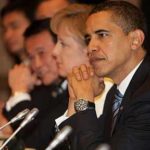
London G-20 – 'Put People First!'
The 2009 G-20 summit, began today in London, running through Friday, April 3d. The overall objective will seek to reach consensus among Leaders of member nations on how to confront the Global economic crisis. The agenda, to say the least, is full. However, there are divergent proposals and solutions, and still many challenges that must first be confronted. This week’s New Yorker magazine contained two good articles that smartly packaged some of the key issues into this piece providing context and insight. Among the many issues to be considered are: a coordinated Global response to the Global economic crisis, developing consensus on an international financial regulatory framework, adoption of international accounting standards (which the U.S has resisted until recently), reaching agreement on the Basel II Accords, determining precisely what kind of Market system we will agree upon as a Global community going forward, import-export issues, coordinating Central Banks policies, among numerous other issues. On this point, in a recent Washington Post interview, Professor John Kirton, director of the G-20 Research Group at the University of Toronto, says world leaders face “a very big job across a very broad agenda.”
“The first thing they have to do is to make sure that the fiscal and monetary stimulus that the G-20 countries are injecting into their economies to get growth back, to provide jobs for their citizens, is enough. That it’s working well. That it’s targeted in the areas that will really help the most. Secondly, they’ve got to make sure that the financial system is working by unblocking the credit channels,” he says.
Other challenges include meeting the Millennium Development Goals and modernizing major financial institutions, such as the International Monetary Fund (IMF), and the Bank for International Settlement (BIS) – arbitor of the Basel II Accords.

US, Europe and Asia divided on global crisis solutions.
This also means comprehensive and modernized supervision and regulation of the financial industry, which the Europeans prefer, will be on the table; while the U.S and the Britain are calling for more fiscal stimulus and a ‘global new deal,’ respectively. In addition, anti-protectionism will be a big concern for import-export powers like Brazil, Japan and Germany. Kirton also warns against a knee-jerk reaction to the global recession. He says, “They have to make sure that we don’t see an outburst of vicious trade protectionism, which everyone knows punishes all concerned. But [it] is such a temptation for politicians to … appear to be doing something for their voters back home.”
“We need to reform the global financial architecture, particularly the World Bank, International Monetary Fund, international institutions that were designed in and for a world of 1944, but really need to be changed for the 21st Century global economy we now have,” he says. However, although the problems are shared by all at the G-20 summit, getting them all to agree still won’t be easy. “When you have up to 28 leaders from very diverse parts of the world, levels of development, culture, it’s very difficult to get consensus – far more difficult than it is to get in the old G-8 club,” he says. For instance, while PM Gordon Brown is calling for a ‘Global New Deal’, one Euopean leader recently called the Anglo-American approach ‘the road to hell,’ While German Chancellor, Angela Merckel, noted at a joint French – German press conference:
‘Merkel said that France and Germany wanted to see “a new architecture and new regulations for financial markets” spelt out very clearly in the final communique of the summit and insisted the meeting must result in concrete actions, not just talking points.’
Professor Kirton also added that the current financial crisis is “characterized by a degree of complexity and uncertainty that’s never been seen before.” At last November’s summit in Washington, the G-20 set the initial groundwork for modernizing the financial structure. This includes assessing financial risks not just at individual institutions, but across the whole Global financial sector. Kirton also says financial institutions must end a pattern of destructive economic behavior.
BRUSSELS — The head of the European Union slammed the U.S. strategy to spend nearly $2 trillion to push the U.S. economy out of recession as “the road to hell” that EU governments must avoid.
The blunt comments by Czech Prime Minister Mirek Topolanek to the European Parliament on Wednesday highlighted simmering European differences with Washington ahead of the G-20 summit.
It was the strongest pushback yet from a European leader as the 27-nation bloc bristles from U.S. criticism that it is not spending enough to stimulate demand.’
“So, for example, when times are good and banks are making a lot of money, they should set aside more capital for a rainy day (bad times). At present of course, when times are good, they think they don’t need that safety net so they put aside less. Then when times are bad, of course, they realize they need it so they start hoard their cash – exactly the wrong thing to do,” he says.
Pres. Obama: We Need ‘New Framework’ for Regulations & Markets at G-20